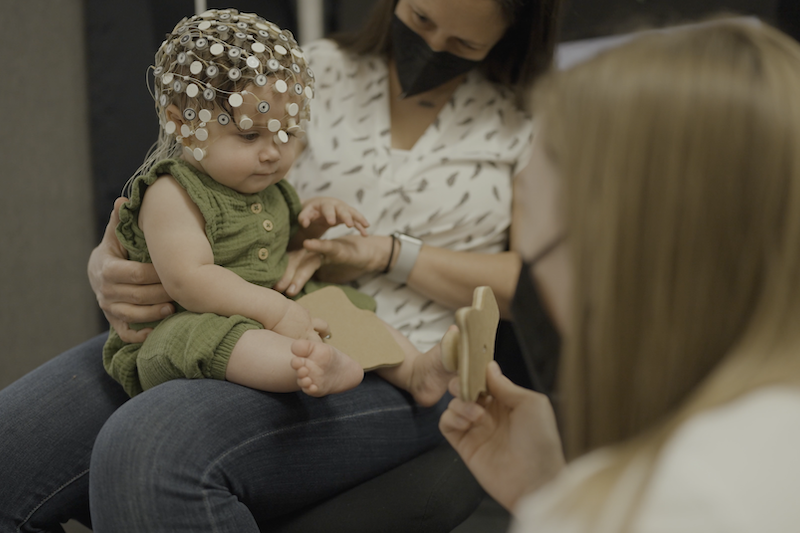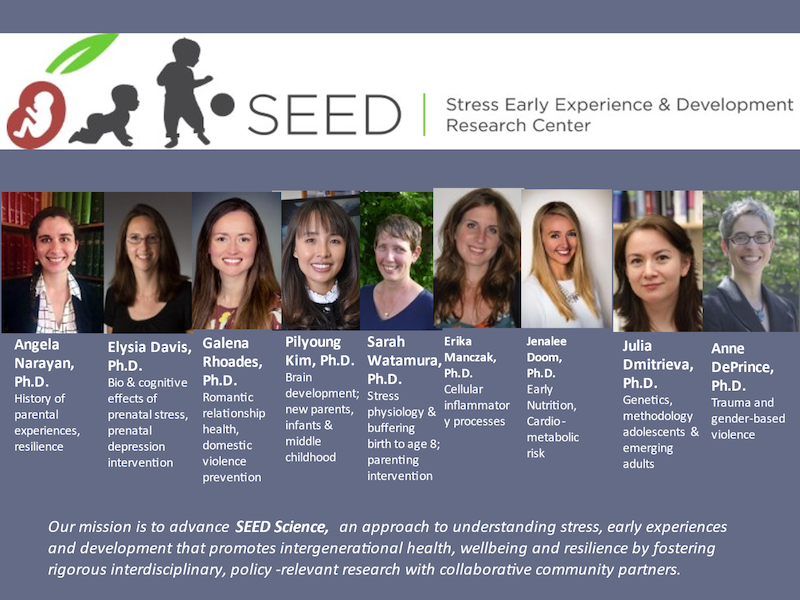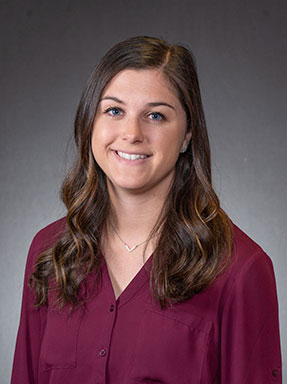DU’s SEED Center Fosters Collaboration Between Researchers and Community Partners

Collaboration is the foundation of the University of Denver’s SEED Research Center. Ten professors from the Department of Psychology, along with more than two dozen PhD students, are juggling dozens of different projects to explore how stress and early experiences shape development across the lifespan.
“The entire group of us is very committed and active in public good,” says co-director Sarah Watamura about her colleagues at the SEED Center. “[Creating the center] was really done intentionally across time to build this breadth of expertise across folks with shared foundational interests in stress in early experiences—[and] also, a shared commitment to research that matters in the lives of people and is impactful.”
The research center was created in 2014 with a mission to advance science, inform policy and develop the next generation of scholars while looking at stress, early experiences and development (SEED). Right now, the center has more than $21.5 million in external awards to support its research projects.
“This type of work really takes a team science approach,” Watamura says. “These are big, expensive projects to [bring to] life. The dedicated attention to collaboration really pushes innovated ideas.”
One project that embodies the SEED Research Center’s goals is the Care Project. This multipart project aims to provide effective psychotherapy during the prenatal period to reduce maternal distress to benefit both the mom and baby. For the past several years, researchers provided this intervention and then followed the children as they grew up.
“The idea is that pregnancy is a sensitive window, not only for the pregnant person,” psychology professor and co-director Elysia Davis says. “Not only is this an opportunity to work with moms and benefit their well-being, but also this is a time when the fetus is undergoing amazingly rapid development from a single-celled zygote to a newborn. We know that experiences in the prenatal period profoundly shape that developmental trajectory. So, we wanted to ask whether by benefiting the mental health of the mother, can we also actually show benefits for the baby?”
After the initial intervention during pregnancy, the team of researchers then evaluated several other factors in the children. One project that Davis works on with assistant professor Jenalee Doom looks closer at cardiometabolic risk to see how stressful experiences might actually change kids’ bodies. In another project, Davis teams up with assistant professor Erika Manczak to look at inflammatory markers to see if the trajectory of those markers, which are linked to mental health and depression, were associated with depression in pregnancy.
Like many of the projects happening at the SEED Research Center, this project would not be possible without the long-standing collaboration with community partners. Davis and her teams have partnered with Denver Health and the University of Colorado Anschutz Medical Campus. This joint effort allows researchers to service a group of patients who might not have the option for a psychotherapy intervention during pregnancy.
“We are reaching individuals who may have typically had less access to mental health care,” Davis says. “We know there are huge disparities in who uses treatment, who has access to treatment and who benefits from treatment. We provide transportation. We provide child care. We are flexible in our scheduling. We really try to make it so people who have a job and kids can still benefit from this.”
Each DU researcher and outside partner brings to the project a different area of expertise, allowing them to explore multiple angles.
“No one person can do everything by themselves,” Davis explains. “All of these pieces require collaboration. In my view, you can’t do good science without those kinds of interdisciplinary collaborations.”
The SEED Research Center is not just a space for teamwork among faculty. It also provides a hands-on opportunity for student collaboration. Around 25 PhD students are involved with the center’s various projects.
“The goal of the SEED Center is to give students opportunities to connect with faculty other than their primary mentor and to connect students from other research backgrounds,” Davis says. “I think that’s super important … not just in terms of building their CV, but also in terms of having these skills and knowing how to work with people who have different perspectives and different backgrounds than they do.”
The Care Project is just one of dozens of research initiatives happening at the SEED Research Center. In addition to Watamura, Davis, Doom and Manczak, professors Anne DePrince, Julia Dmitrieva, Pilyoung Kim, Lauren McGrath, Angela Narayan and Galena Rhoades work on research projects with the center. To learn more about the working happening at the SEED Research Center, visit the website here.

Not pictured: Lauren McGrath



